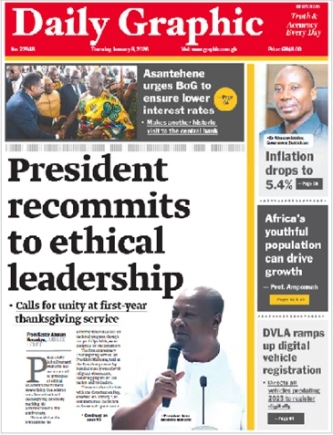
Intra-Africa trade to guarantee better future
Countries in Africa have been asked to desist from paying lip service to stipulated protocols that are supposed to promote intra Africa trade.
Instead, they are to work to ensure that protocols are addressed and domesticated or included in their national laws so that implementation challenges can be addressed.
The Country Director of SEND Ghana, a non-governmental organisation, Mr George Osei-Bimpeh, in an interview with the GRAPHIC BUSINESS, on the occasion of the commemoration of the Africa Union (AU) day, said more importantly, countries in the region can at least start intra-trading from sub-regional level or regional economic blocks.
“The AU can work with the regional blocks to promote intra regional trade. We cannot just leapfrog but we start from somewhere and that will serve as a foundation as we move into full implementation of eliminating trade barriers from the continent,” he said.
According to Mr Bimpeh, there is a huge potential to increase intra-Africa trade to guarantee a better future for the continent, however, increasingly Africa has not taken advantage of its own population in terms of promoting trade.
“Nigeria may be thinking about salt but may look outside to Brazil because Ghana which can produce salt is not taking advantage of its potential partly because it has not developed its domestic capacity to take advantage of the potential trading opportunity,” he said.
Hurdles to trade in Africa
A report by the World Bank (WB) highlights widespread opportunities for African countries to trade goods, services and investments across borders.
Other statistics show that intra-European trade accounts for about 70 per cent, intra-Asian trade at about 62 per cent and intra-South American trade around 26 per cent.
African countries still have much to do to increase intra-regional trade estimated at about 12 per cent. This is in comparison to the trade between Africa and Western Europe which is estimated at more than 50 per cent.
Mr Bimpeh deduced that trading within the region has been low due to the uncompetitive nature of commodities which are largely primary.
Consequently, he said, countries turn to compete among themselves and so have not diversified to create a more congenial atmosphere for intra trading to flourish.
“Let’s take the ECOWAS sub-region and look at the difficulty with which traders across the borders go through in terms of harassment in the hands of border officials which more or less seem to be institutionalised to part with a certain amount of money and so that is a problem,” he said.
Also, he said there is no preferential treatment for traders within the sub-region coupled with lack of uniformity in terms of implementation of some protocols, of which no conscious effort is made to promote free trade.
Where to begin
He recommended that conscious efforts should be made to ensure strict and honest implementation of protocols such as the ECOWAS protocols on movement of persons and goods and services to promote trade between countries.
“The incoherence in our own laws and the fact that natives are sometimes resistant to competition is also one thing. Some countries tighten their markets in terms of allowing penetration of other regional nationals and this does not allow trading to develop,” he said.
He called on African countries to foster economic integration by breaking down the various barriers that hinder trade.
The African Union
A regional integration agenda has been part of Africa’s strategy for economic transformation for more than three decades, and in some cases for almost a century
The AU vision is for an integrated, prosperous and peaceful Africa, driven by its own citizens and representing a dynamic force in international arena.
African leaders now recognise more than ever the urgency of accelerating Africa’s integration and the urgency is reflected in the varying development agendas that African countries have adopted thus far.
These include the New Partnership for Africa’s Development (NEPAD), an Action Plan for Boosting intra-African trade (BIAT) and Agenda 2063.
Agenda 2063 is a strategic framework for the socio-economic transformation of the continent over the next 50 years. It builds on, and seeks to accelerate the implementation of past, existing and new national, regional and continental initiatives for transformative, inclusive real growth equity, rapid, resilient and sustainable socio-economic development.
Indeed, Africa has more recently agreed to establish an African Continental Free Trade Area by 2017 but there is still much work to do in order to meet these.
 Click the link to read your copy.
Click the link to read your copy.